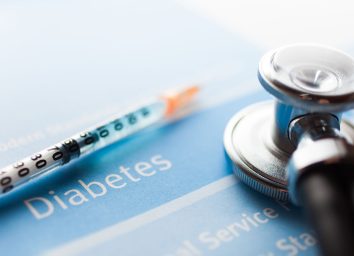These 3 Health Conditions Make Getting COVID-19 So Much Worse

More than 500,000 people have died from COVID-19, globally, about 25% of whom were from the United States. While no one is guaranteed recovery from coronavirus, there are certain groups of people that are at higher risk of fatality than others, irrespective of age.
Dr. Mark Cucuzzella, MD, FAAFP, explains just three of the underlying medical conditions that increase a person’s risk of severe illness from COVID-19. (Remember, information about coronavirus is changing regularly and we’re working hard to report on the most up-to-date information. Stay informed by signing up for our newsletter so you don’t miss a beat.)
What are three preexisting conditions that make you more likely to experience adverse symptoms to COVID-19?
“Today, nearly 3 out of 4 Americans are overweight or obese and 50 percent of adults are diabetic or prediabetic,” says Cucuzzella. “Recent research has shown that in the United States, the majority of individuals needing hospitalization due to COVID-19 had a preexisting health condition, such as hypertension, obesity, and type 2 diabetes.”
Cucuzzella says that hypertension, obesity, and type 2 diabetes, in some cases, can stem from the same issue: insulin resistance. Insulin resistance occurs when your pancreas produces more insulin than what’s needed to grab glucose (sugar) from your bloodstream and transfer them to your cells. This condition is also referred to as hyperinsulinemia.
While there are many factors that contribute to the development of insulin resistance, such as genetics as well as sleep and exercise patterns, Cucuzzella says, “the primary driver across the board is a diet high in simple and refined carbohydrates especially fructose, which acts on the liver to create this condition.” (Related: 7 Precautions People With Diabetes Should Take Now to Avoid COVID-19.)
About how much more likely are you to die from COVID-19 if you have one of these preexisting conditions?
“Although we don’t have completely accurate data, our best estimates from Europe as well as the United States put it about three to six times risk,” Cucuzzella says.
Now, for someone between the ages of 30 and 40 years old who also has diabetes, their risk of dying might be similar to someone who is much older, say, 75 years old, for example, Cucuzzella clarifies.”We will learn more as this pandemic proceeds, but it’s safe to say now is a good time to reverse your [type 2] diabetes if you have it,” he adds. (Related: You Could Cut Your Diabetes Risk by 60% Just by Doing This.)
How can a change in diet help reverse each of these three conditions?
If there has ever been a better time to get your health in tip-top shape, it’s right now. Adopting a predominantly plant-based diet is believed to make a substantial difference. Someone who eats processed foods that are high in sugar and saturated fat is at higher risk of obesity, which is associated with heart disease, diabetes, and even cancer.
“Type 1 diabetes and type 2 diabetes are chronic diseases that impact how your body regulates blood sugar, or glucose, which fuels your body’s cells,” says Cucuzzella. “Insulin is needed to make this happen.” (Related: The Difference Between Type 1 and Type 2 Diabetes.)
For some, type 2 diabetes can be reversed through diet and persistence.
“For all three of these preexisting conditions, research shows that cutting back on carbs has the greatest effect on regulating blood sugar levels and reducing the chronically high insulin levels,” he adds.
The key is to strike a balance between eating high-fiber carbs, such as whole grains, fruits, and vegetables; lean proteins including legumes, fish, and poultry; and healthy fats such as nuts and olive oil. This will help stabilize blood sugar levels so that they neither drop nor spike.
“Easy low carb swaps include swapping out a burger bun for lettuce wraps or snacking on low glycemic blueberries instead of pretzels,” says Cucuzzella. “The most nutrient-dense foods with high-quality proteins and fats need to be on the menu every day. These include eggs and seafood, meat and cheese, and high-quality dairy products.”
By incorporating more healthy foods, cutting back on sugar, exercising, drinking plenty of water, and getting at least seven to eight hours of sleep every single night, you can further promote better health outcomes and have a stronger chance of fending off disease. For more insight on which foods to steer clear of, check out 50 Worst Foods for Diabetes.








